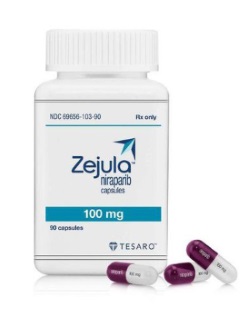Takeda’s Zejula (ingredient: niraparib) became eligible for an insurance benefit, according to the Health Insurance Review and Assessment Service’s pharmaceutical reimbursement evaluation committee. The drug is a poly ADP-ribose polymerase (PARP) inhibitor to treat ovarian cancer and gained a local license in March.

Unlike another ovarian cancer drug AstraZeneca’s Lynparza (olaparib), Zejula can be used regardless of BRCA -- breast cancer gene 1, 2 -- mutation. Zejula’s merit can bring a sea change in the domestic ovarian cancer treatment market, experts said.
Zejula won the nod from the Ministry of Food and Drug Safety as “a single maintenance therapy for adults with platinum-sensitive recurrent high grade serous ovarian cancer (including fallopian tube cancer or primary peritoneal cancer), who responded to a secondary or more platinum-based therapy.”
Lynparza obtained the license in the same treatment stage in 2015 and became reimbursable in 2017. It can be used only for patients who are BRCA mutation-positive, whereas Zejula is available regardless of the patient’s BRCA mutation.
In general, only about 15 percent of ovarian cancer patients are BRCA mutation-positive in Korea. The rest 85 percent could not get access to PARP inhibitor therapy. However, Zejula moved an inch toward getting insurance benefit as it recently passed the drug reimbursement evaluation committee’s review.
AstraZeneca is reportedly seeking an expansion of indication of Lynparza as maintenance therapy for the first-line treatment of ovarian cancer. Given Lynparza was developed as the first PARP inhibitor, the drug has an indication for both as maintenance therapy for the first-line treatment of ovarian cancer and treatment for breast cancer in other countries.
AstraZeneca recently changed Lynparza capsules into tablets and discontinued the sale of Lynparza capsules permanently in August. In Korea, the drugmaker is seeking to change capsules to tablets in approval conditions as it tries to expand Lynparza’s indication, news reports said.
Even if AstraZeneca gains the nod for Lynparza as the maintenance therapy for the first-line treatment, however, it will have minimal impact on Zejula, observers said. This is because Zejula is likely to get insurance benefit after improving progression-free survival (PFS) in a study on the first-line maintenance treatment, they said.
GSK disclosed topline results of a phase-3 PRIMA on July 15, announcing that Zejula met the primary endpoint as the maintenance therapy in the first-line treatment for ovarian cancer.
The company said Zejula showed improvement in PFS for patients regardless of their biomarker status such as BRCA mutation.
Zejula is the only medicine among four PARP inhibitors that can be used regardless of BRCA mutation. If it pulls off getting an expanded indication for maintenance therapy for the first-line treatment for ovarian cancer, it is likely to change the dynamics of the ovarian cancer treatment market, analysts said.
Takeda has the sales rights of Zejula in Korea, whereas GSK owns the sales rights of the drug around the globe, except for Japan, Korea, Taiwan, Russia, and Australia.

